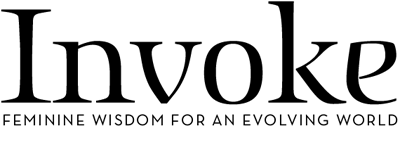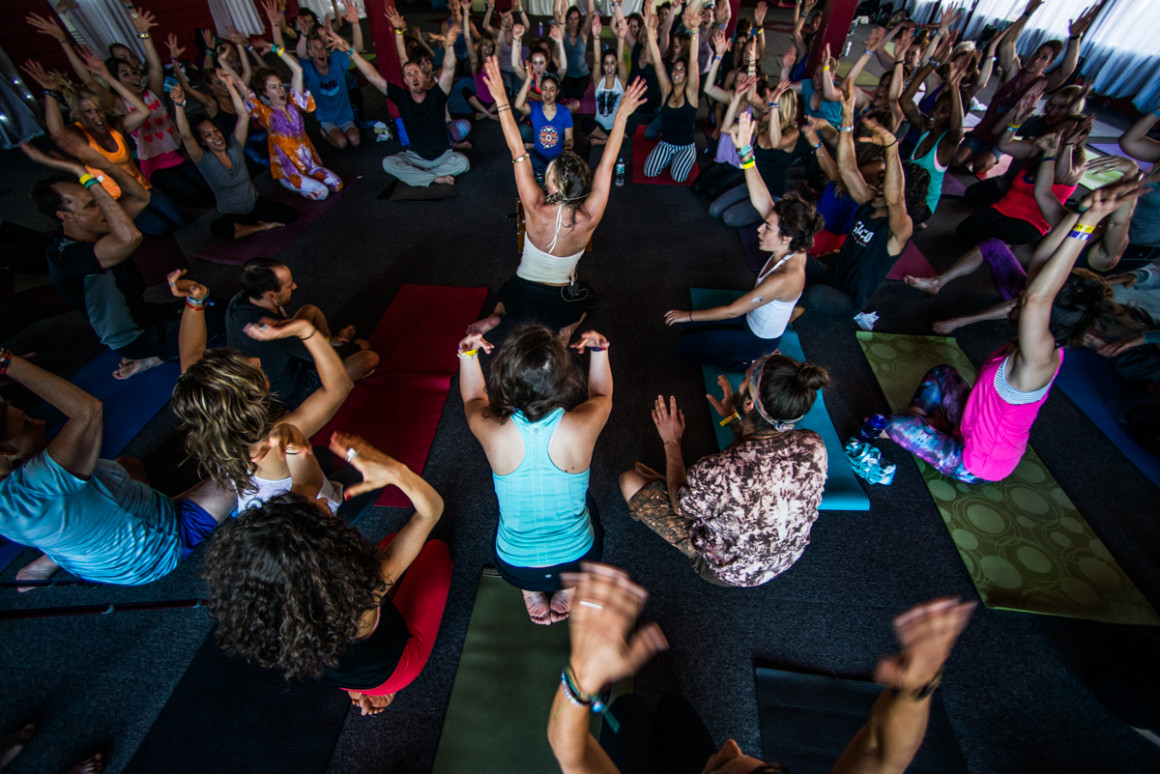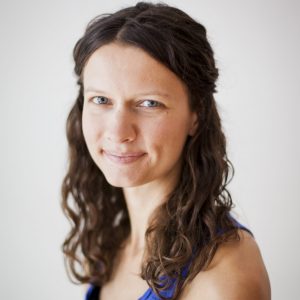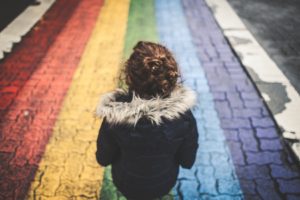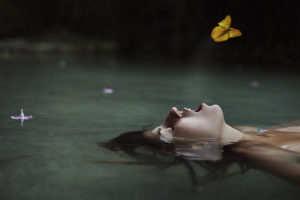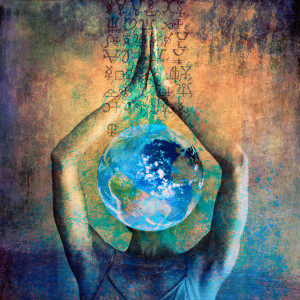In 2007, Suzanne Sterling joined with Seane Corn and Hala Khouri to create Off the Mat Into the World, a nonprofit aimed at bridging yoga and conscious activism, taking the fruits of practice out into the world.
I first heard Sterling talk about these ideas at a workshop at the Minneapolis Yoga Conference. Inspired by that two-hour taste, it felt like kismet when I discovered that one of Off the Mat’s three Yoga, Purpose and Action Intensives in 2014 was going to be in Minneapolis. Trusting this spark, I quickly signed up.
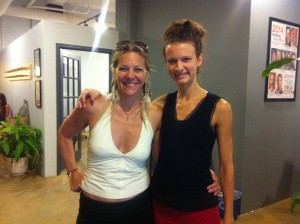
It was inspiring to watch these three women inhabit their personal power in completely different yet authentic ways—Seane Corn pushing our boundaries with intense vinyasa flow, Hala Khouri layering in her academic work around trauma, and Suzanne Sterling getting a room full of reserved Midwesterners dancing and vocalizing to primal drum beats, her intense passion and freedom unlocking ours. It was a great reminder that service can take many different forms, and behind it all can be joy.
In part one of our interview, we discussed finding your voice. One thing I wonder: As you strengthen your voice and tune into your truth, how do you then use that to move toward action and service in the world?
One of the things we do with Off the Mat is we begin with a process of self-inquiry: Why do you want to serve? What is your motivation? If your motivation is to escape your own pain by serving other people’s pain or to help other people because you can’t take responsibility for yourself, that’s disingenuous and not as effective. Whereas if you begin by saying, "I’m taking responsibility for my own wounds, and then my own wounds can then become my gift of compassion for the world," then I’m coming to the suffering of the world from a very different place.
After we get to that point where we’ve looked at our own stuff and we’ve taken responsibility for it, then I get people moving into: What breaks your heart about the world? Can you begin to become a voice for those that have no voice?
Like today I was reading how these poachers in Africa killed the largest elephant on the planet; he had these tusks that were so big they reached the ground. One of my big heartbreaks is the elephants and the whales. I have to speak for all the elephants and what incredible teachers they could be for us, and that’s my job because I care so strongly about that. So that’s what we try to help people do is translate that heartbreak—not get caught up in my own personal heartbreak, but to say I’m responsible for my own issues, I’m not serving the world because I haven’t looked at my own shit, I’m ready to serve from a place of wholeness, and then I give voice to what I care deeply about. And I can give a more feminine voice, which is to say a more embodied and emotional voice. Not like I’m going to cry every time I talk about it, but I’m not going to be dissociated from it either. I’m going to give voice to it from that very grounded place.
That seems like an important piece of the puzzle: looking at your own wounds and coming from that place of wholeness.
A lot of people in the activist world will get really burned and fatigued, because they don’t have that sense of wholeness. They might start out with it, but there’s just so much crisis and so much addiction to the crisis that they get depleted. So I think self-care is a big piece too. And this sounds so trite: The more we actively take care of ourselves, the more we can have a foundation from which to act.
I’m curious about that intersection of spirituality and activism; it seems like they’re often separate camps—one focused on being and one on doing. What are you seeing of these two worlds and how they can benefit each other?
Our goal when we founded Off the Mat was to be that bridge. The yogis are relatively wealthy, they’re relatively educated, and a lot of times they have no idea where to begin to be activists but they are starting to understand there’s a lot to do and a lot to care about. They have stepped out of the trance of consumption into, "Wow, there’s a world out there and I have something to give it." The activists, on the other hand, are oftentimes feeling very alone; they don’t feel like they have community, and they don’t have methodology for self-care that they can tap into for longevity and sustainability. So we thought, let’s bridge these two, and it’s been really successful.
Mostly we see yogis who are like, "I care but I don’t know how to begin." And then it’s simply getting people to focus. You can care about the world, but to act you actually have to pick something to act on, right? You can’t just be like "Oh, the world’s fucked up and I’m depressed about it," you have to be like, "Well, one thing I really care about is children without homes, or one thing I really care about is animal rights"; then you can begin to move toward real solutions.
For some people, helping them find their voice is a huge piece. For others it’s just giving them permission to begin. Pointing out to them that even though they’re not perfect and they don’t think they have enough resources, they have more resources than most of the rest of the world, so they have to begin.
I see people struggling with exactly what you mentioned: They want to help, their hearts break, but they get overwhelmed and end up stuck. How do you take that first step?
You have to be unafraid to start to talk about what you’re passionate about. I think a lot of people are afraid of being seen as silly or uneducated. And it's true, there are so many mistakes you can make, but we have to be willing to make mistakes. It’s like when you’re a yoga teacher, people always come up to you and go, "I’d love to do yoga, but I can’t touch my toes." And you’re like, "Well, if you do yoga, then you will touch your toes!" The only way you’re going to learn to sing is to open your mouth and make squawky ugly sounds for a while and then you get better.
I imagine you come face-to-face with difficult things through Off the Mat: natural disasters, manmade disasters, people experiencing suffering. How do you engage with that in a vulnerable, open way without getting totally overwhelmed?
Great question. Some of the greatest suffering I’ve seen is through the Global Seva Challenge, which I’ve been the director of for the last nine years. We’ve consciously immersed ourselves into places where there’s profound suffering. And we do what we call practicing presence, and that’s simply not disassociating, not being objectively separate from the suffering, and trying not to get overwhelmed by it.
On those trips, we’re vigilant about doing yoga in the morning, then we can go out in the field all day—to garbage dumps or orphanages or torture chambers or wherever we’ve gone—and pay attention and stay present in our bodies as we’re experiencing it. We have to give people a little trauma training and what it feels like to be in your body when you’re experiencing something intense. And then almost every night without fail, even if it’s 11 pm and we’re exhausted, we come back and process. The processing can look different, but the processing is the crucial piece, because it’s allowing ourselves to integrate what we’ve experienced. A lot of times when people experience intense stuff, they shut down and go into coping mechanisms like overeating, smoking or drinking, disassociating while watching TV, or picking a fight with their loved ones; the list goes on. Because we’re aware of that, we name it.
And so the whole trip is not just about serving those we’re serving, it’s also about the participants on the trip and how their lives are changed by that work in and of itself. We’re training people to work with trauma.
How do you personally stay grounded with all the things you’re juggling—music, service, teaching, your priestess apprenticeship programs, etc.?
My daily practice is crucial for me. And I have certain mentors and a therapist and people that are on my team, so to speak. In Off the Mat, I work with other women who make me look like a slacker. I feel like I’m a highly productive human being, but I’m actually one of the more chilled-out people in that situation. I’m always the voice for can we slow this down, can we go slower, can we take our time with this? Even though we could participate in that model of faster is better and expansion is where it’s at, can we slow things down and model something else? I’m trying to do that with my own life, and that’s very challenging, because it’s not rewarded in our society. Nobody’s going to give you an award for resting well.
I wish they would!
I wish they would too. Maybe I should do that. One of the things I started in the fall is a new initiative, an online finding-your-voice apprenticeship called Voice of Change. I’m very excited about it; it’s kind of like compiling my life’s work. Maybe one of the things I can put in there is changing the voice of what’s important, what’s successful, right? Because successful to me looks like health as opposed to productivity. It’s easy to say that, but it’s hard to do.
It’s so ingrained in many of us that we prove ourselves by working hard and we have to earn rest rather than deserving rest.
Maybe we should do the self-care and rest award! [Laughs.] We’ll give that award to people who get stuff done but also take a nap and take care of themselves. I hate to say self-care because it’s been appropriated to mean narcissistic navel-gazing that can be too self-referential. So I hesitate to use that word, but maybe the Self-Care Awards, somebody who embodies balance.
After doing Off the Mat for nine years, what have you learned about effecting change vs. going in and trying to impose change?
We’ve learned a lot about that. One of the greatest changes we’ve made over the years is, in our trainings we give background on global power dynamics and social justice issues. The demographic of the yoga community is wealthy middle-aged white women, and that’s not the demographic they’re going to be serving. So what happens when you come into a demographic that’s not your demographic and try to “serve”? We try to give people an understanding of what the elements of that are and what the pitfalls might be.
In directing the Global Seva Challenge, we’ve made a lot of mistakes but we also did a lot of things right. For instance, we always work with organizations that are in-country. When we went to Haiti, we worked with an organization that was doing microloans for women and had been there for 20 years. They weren’t a foreign organization, they had Haitians running it. We’re going in and finding these organizations and saying, "What do you need?" Because we don’t know what you need; you know what you need.
I went to Haiti and did a site visit ahead of time to look at the projects, and what I realized is people in Haiti have had so many handouts, and so many people coming in to “help,” and that was the last thing they needed. What they needed was self-determination. What they needed was the microloan program. And so, we try to be aware of those issues and how bloody insensitive it is for rich white people to come into any culture and impose.
Have you experienced music as something that can help connect across different cultures?
Oh my god, that’s my favorite part about my life! The biggest thing I’ve learned from all of this is music changes everything. Everywhere we go, I bring my drum and try to get everyone singing and dancing together. In many cultures that’s the first thing they do—people come up singing and dancing as a way to welcome us and to thank us for whatever we’re doing for them. We always sing back, and they’re often surprised.
A couple times it’s been amazing what’s happened. For instance, in Haiti, one day we’re at Sean Penn’s tent city, and they had asked us to move a garbage dump from one place to another. It was a burning garbage dump. There were like 20 of us, mostly women. And the whole tent city of villagers was standing around watching us and laughing. It was very uncomfortable. We didn’t speak the language, so we didn’t know whether they were laughing at us or laughing with us. We kept trying to get them involved, and they were like no way. So I picked up a plastic jug out of this garbage dump and started playing it and got everyone singing, and all of a sudden the little Haitian kids came over and started singing with us, and then finally we got a few adults to come over and sing with us. We got everyone singing and dancing in the dump. And by the end of the day, we had like a conveyor belt of garbage moving, and the entire village including the kids had helped us to move this dump from one place to another. Sean Penn’s people were like, “We’ve never seen anything like that!” It was a party. It was awesome.
Music is a connecting thread through everything for you. What’s calling you musically right now?
I went to print with a new album called "Wings: Simple Chants for Everyday Rituals." Simple chants you can use to get groups of people singing and dancing together. And I just finished the music for Seane Corn’s new DVDs on Sounds True. The next album I’ll be working on will be dance music. I want to get people up and dancing; that makes me happy. They’ll be shake-your-booty songs.
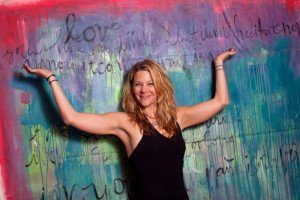 Any parting words of wisdom for us?
Any parting words of wisdom for us?
I feel that right now is the time of the woman’s voice. I feel really grateful to be able to do this work because I feel like if we don’t speak—and I’m not talking about speaking louder than each other or louder than men—but if we don’t speak in the wise woman’s voice and find places to honor that softer/deeper woman’s voice, I feel like we’ll lose our opportunity to evolve, and that could have disastrous consequences. We don’t have to have 2,000 years of matriarchy now, but we have to stand up and allow ourselves to be clear that we are the voice of change. We have to do the work necessary to find the strength within ourselves to stand for something different. Yee-haw!
To learn more: Off the Mat does leadership trainings around the U.S., as well as service programs, grassroots organizing, and Global Seva trips (2015’s is to Kenya). Learn more at offthematintotheworld.org.
